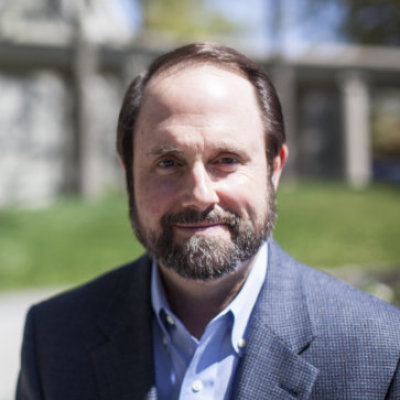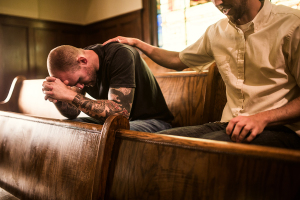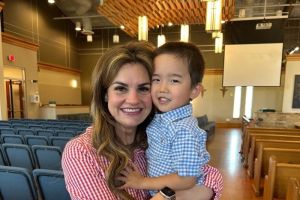Churches respond to weather crisis in Texas: How I learned a transforming lesson about gratitude

In each of my radio interviews last week, I was asked about our weather crisis in Texas. People from California to Minnesota to Florida and points in between are following this story. Our winter weather even made The New York Times, and for good reason.
A family in Killeen was forced to ration oxygen for their premature baby. They had to burn their 3-year-old daughter’s wooden blocks in their fireplace for warmth. Most of us have now seen our power restored, but some 7 million Texans still do not have access to clean, running water. The extreme weather has been blamed for at least 40 deaths in Texas and elsewhere.
But there is good news in the news as well: Dallas churches and other faith groups helped create an emergency warming shelter for the homeless. The Salvation Army and other faith groups are providing meals and other supplies for those in need. Volunteers are helping migrants who are sheltering in the cold. Lakewood Church in Houston is just one of many churches that has opened its doors to serve as emergency shelters.
I will never take electricity and clean water for granted again. Or those who provide such essential services.
Sleeping by our fireplace
As a result of our power outages, I became interested for the first time in our state’s electricity infrastructure. I learned that Texas utilizes more than 650 power generation facilities connected by more than 46,500 miles of transmission lines to provide electricity for our state. Our power is produced from natural gas, coal, wind, nuclear, solar, hydro, and biomass resources.
Someone had to design and build every one of these facilities, lay every mile of transmission line, and create the means by which we convert natural resources into electricity. People have to operate the infrastructure that delivers this electricity to us, then repair that infrastructure as needed. Workers have been braving dangerously cold conditions to restore our power.
Until last week, I confess that I had never considered any of this.
You and I could create a long list of other services we take for granted. Who built and operates the internet or cellular connection you are using to read these words? Who designed and built the electronic device on which you are reading them? How much of your home or office could you build? How much of your food could you produce? How many of your clothes could you make?
Earlier this week, Janet and I were sitting and sleeping near our gas fireplace for warmth. We talked about the days when this was how most people kept warm in the winter. But I admit that I didn’t consider the fact that we have a gas fireplace and gas to power it, a convenience much of the world does not enjoy.
'Man in his pomp will not remain'
One way God redeems suffering is by using it to inspire gratitude for that which suffering threatens.
Our electricity and water crisis in Texas calls us to gratitude for electricity and water. The coronavirus pandemic calls us to gratitude for life and health. The recession calls us to gratitude for the financial resources we still possess. The Jan. 6 attack on the Capitol calls us to gratitude for the democracy it threatened. The growing threats against religious liberty call us to gratitude for the religious freedom we enjoy.
And the finitude of this life calls us to gratitude for the greater life to come.
The psalmist noted: “Even the wise die; the fool and the stupid alike must perish and leave their wealth to others. Their graves are their homes forever, their dwelling places to all generations, though they called lands by their own names. Man in his pomp will not remain; he is like the beasts that perish” (Psalm 49:10–12).
By contrast, the psalmist rejoiced to testify, “God will ransom my soul from the power of Sheol, for he will receive me” (v. 15). If Jesus is your Lord, he will receive you as well (John 14:3).
Gratitude for the friendship of God
Father Stephen Freeman, a priest in the Orthodox Church in America, recently wrote an insightful essay titled “The Last Temptation.” Focusing on Satan’s offer to give Jesus “all the kingdoms of the world” in exchange for his worship (Matthew 4:8–9), he notes that Jesus chose instead to make his Father his King through the suffering of the cross.
Fr. Freeman suggests that Jesus’ temptation is ours. Rather than serving God through the way of suffering, we want God to eliminate all suffering. When he does not, we reject him in anger for what he will not do rather than serving him in gratitude for all he has done.
The season of Lent began last Wednesday. As we travel these weeks on the way to Calvary, my prayer is that we will make this a season of gratitude. Let’s turn the needs we face into gratitude for the blessings we have received (1 Thessalonians 5:18). Let’s turn the temptations of our enemy into gratitude for the strength of our Father (2 Corinthians 12:9). Let’s turn the enmity of the world into gratitude for the friendship of God (James 4:4).
Then, let’s express our gratitude for our Father’s grace by serving him and others at any cost (Romans 12:1; 1 Peter 4:10). Let’s see the price of our obedience as an opportunity to show our Savior the depth of our love.
Fr. Freeman notes, “The Cross always appears to be weakness and foolishness—and thus its followers must be willing to become weak fools.”
How will you be a “weak fool” for Jesus today?
Originally published at the Denison Forum
Adapted from Dr. Jim Denison’s daily cultural commentary at www.denisonforum.org. Jim Denison, Ph.D., is a cultural apologist, building a bridge between faith and culture by engaging contemporary issues with biblical truth. He founded the Denison Forum on Truth and Culture in February 2009 and is the author of seven books, including “Radical Islam: What You Need to Know.” For more information on the Denison Forum, visit www.denisonforum.org. To connect with Dr. Denison in social media, visit www.twitter.com/jimdenison or www.facebook.com/denisonforum. Original source: www.denisonforum.org.



























